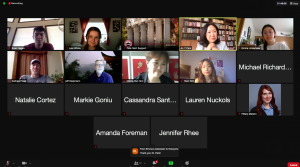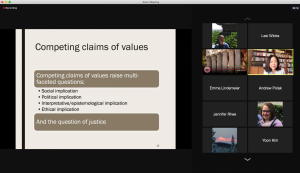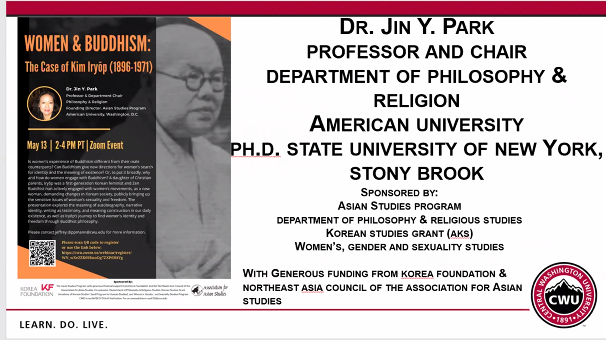Asian Studies program invited guest speaker to discuss ‘Women and Buddhism’
May 19, 2021
How do women engage with Buddhism? It is one question among many that Jin Park addressed May 13 in a women and Buddhism webinar. By taking a look into the life of Kim Iryǒp (1896-1971) Park hopes to find the answer.
The webinar had a total of 23 people in attendance, including Park. Park’s passion for the subject reflects in her extensive credentials as she obtained a doctorate from the State University of New York, Stony Brook, is currently the professor and chair of the department of philosophy and religion at American University, and was the first person to translate Kim’s writing to English.
According to the Department of Philosophy and Religion Studies Chair and Director of the Asian Studies Program, Jefferey Dippmann, this webinar would have not been possible without the distinguished speakers grant funded by the Korean Foundation and Northeast Asian Council of the Association for Asian Studies.
The two hour long webinar focused on the writings of Kim, a writer, feminist and Zen Buddhist nun. Kim’s unique experiences throughout life piece together several concepts, allowing students to connect with at least one.
In Kim’s youth, she was able to get an extensive education which was highly unlikely for women in Korea during this time. Through this, she became increasingly aware of the gender discrepancies within society.
Women had arranged marriages, were not given the education men were and were expected to stay home to raise a family. Because of this, Kim used her strength in writing to advocate for change by starting a magazine called Sinyoja (translates to ‘The New Women’) in 1920.
The New Women was a magazine specifically for women, created by women that preached liberation and “free love” defined as the concept of having freedom to be with someone or many people for the sake of love rather than an arranged marriage.
Just eight years after the start of her magazine, Kim began Buddhist meditation and later joined the monastery in 1933 where she stayed until her death in 1971. Kim lived two very different lives, one as a feminist writer and the other a celibate Zen Buddhist nun. Park analyzed both lives and said she found they were not so different after all.
Throughout both lives, Kim sought out one thing: freedom. In her early days at The New Women she searched for freedom through the concept of free love which we see in her writing for the magazine.
After joining the monastery Kim did not write for nearly two decades. However, she later published some of her writing in the 1960’s that was less like a call to action and more of a testimony.
Her later writings consisted of personal stories from her youth, her friends stories, philosophy and Buddhism practice. Expressing philosophical concepts and Buddhism practice through personal narratives made her story different from the others and more interesting to many.
These writings shed light on the compatibility and overlap between concepts such as gender, Buddhism and feminism. Park discussed the overlap of concepts in great detail by both bringing in her knowledge of Kim, the Buddhism practices, direct quotes from Kim’s writings, as well as other quotes from similar works.
The last thirty minutes of the webinar was set aside for questions. Several students asked questions all varying in topic and detail. Park took the time to address and answer each one as thoroughly as possible.
Dippman said this webinar was “very relevant to the 21st century and for what we have been going through with the pandemic.”
This claim translates into the presentation as there were many parallels within today’s society.


